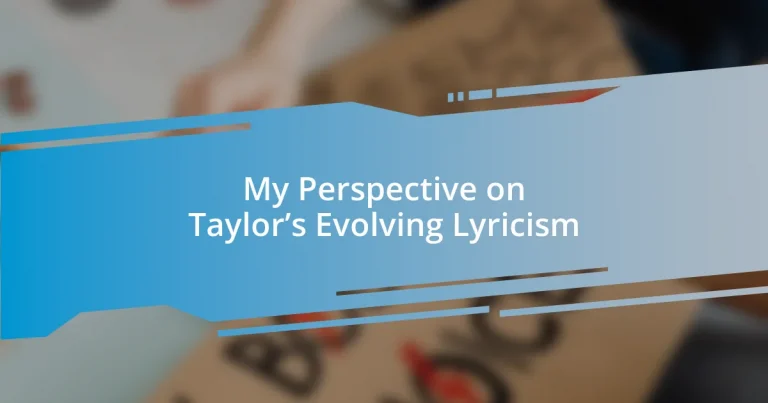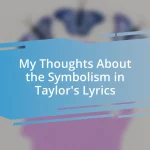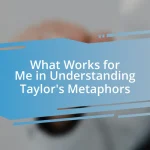Key takeaways:
- Taylor Swift’s lyrics evolve from simple themes of youthful heartbreak to complex narratives reflecting personal growth and universal experiences.
- Her personal experiences deeply influence her music, allowing listeners to connect through shared emotions and struggles.
- Collaborations with other artists enrich her storytelling, adding diverse perspectives and emotional depth to her songwriting.
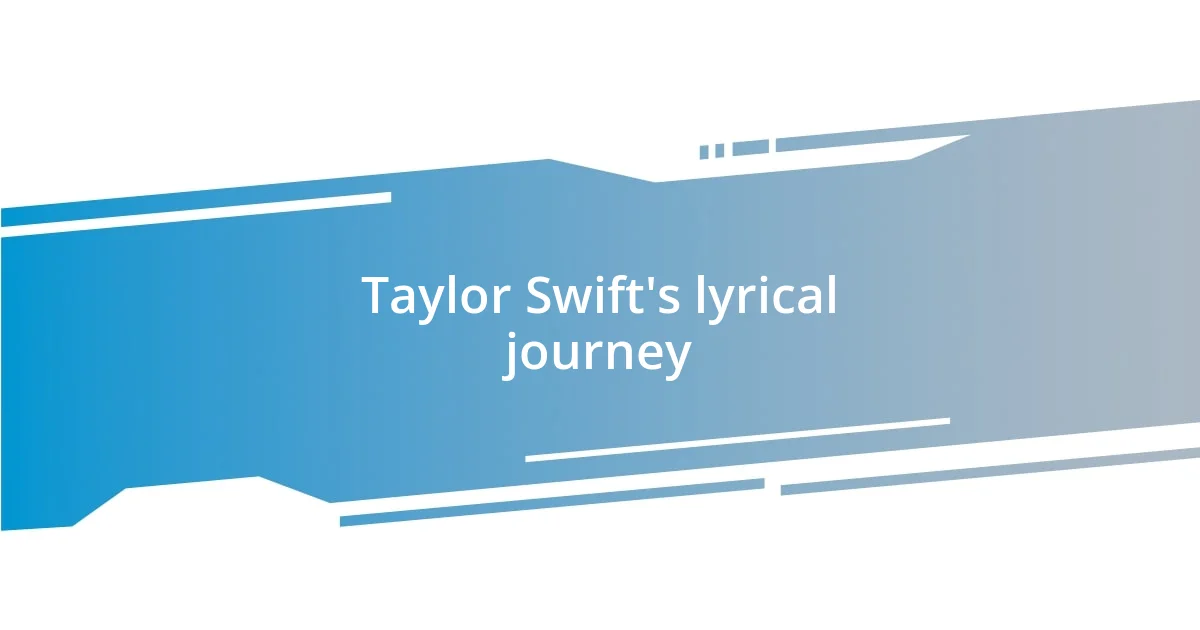
Taylor Swift’s lyrical journey
Taylor Swift’s lyrical journey is nothing short of fascinating. I remember my first encounter with her early work, when “Tim McGraw” played on the radio and I was struck by how she could evoke such vivid emotions in just a few lines. It made me ponder: how does she manage to connect so deeply with her audience?
As her career evolved, so did her lyrics, transforming from youthful tales of heartbreak to intricate narratives reflective of personal growth. I found myself captivated by “Folklore” and “Evermore,” where she painted complex stories in a way that made me feel like I was sitting by a fire, listening to a friend share their innermost thoughts. Isn’t it remarkable how she seamlessly shifts from catchy hooks to profound symbolism, inviting us to reflect on our own experiences?
What stands out to me is how Taylor’s storytelling grows with her. Listening to her music feels like watching someone blossom—her lyrics are more than just words; they’re a mirror to our own lives. I often think, can any artist really capture the essence of change as well as she does? In just a few albums, she has shown us that songs can be both personal and universal, resonating across generations.

Impact of personal experiences
When I reflect on Taylor Swift’s lyrics, it’s clear that her personal experiences strongly shape her music. I recall listening to “The Archer” for the first time and feeling like she was exposing her vulnerabilities right in front of me. It’s almost as if she takes her life lessons—whether heartache, friendship, or self-doubt—and crafts them into melodies that resonate deeply with listeners. It reminds me of a time when I faced uncertainty in my own life; her lyrics provided both comfort and reflection, teaching me that even in struggles, there are stories worth sharing.
- Taylor’s willingness to delve into personal hardships allows her fans to feel seen and understood.
- I remember feeling a connection to her in “All Too Well,” as she articulated the complexity of memories—how some moments feel like a bittersweet embrace.
- Her evolution from teenage themes to adult struggles mirrors the experiences of many of us navigating through different life stages.
- For me, her transitions in lyricism inspire a sense of camaraderie, illustrating how our stories, no matter how unique, can intertwine through shared emotional landscapes.

Themes in early works
When I think about Taylor’s early works, the recurring themes of love, heartbreak, and youthful innocence truly stand out. Songs like “Teardrops on My Guitar” evoke memories of those intense emotions we all experience in our teenage years. Listening to it reminds me of a past relationship where every glance and laugh suddenly felt monumental. Her ability to articulate heartbreak with such simplicity makes the listener feel that they’re not alone in their experiences.
As I revisit tracks from her debut album, I can’t help but notice the overarching theme of nostalgia. For instance, “Our Song” encapsulates the carefree spirit of first love, and it takes me back to those simpler times spent with friends under the stars, making promises that felt eternal. Each lyric serves as a reminder that those fleeting moments—though bittersweet—present themselves as cherished memories we tend to hold close.
The blend of storytelling and raw emotion is what makes Taylor’s early lyricism resonate with many. I often find myself reflecting on how the themes of friendship, loyalty, and longing manifest in our own lives. It’s fascinating how her simplistic yet profound lyrics, like those found in “Fifteen,” allow us to reflect on our formative years—those moments which shape who we are today. I can’t help but wonder: how many of us have felt lost in the shuffle of growing up, only to find a comforting song that echoes our fears?
| Song | Theme |
|---|---|
| Teardrops on My Guitar | Heartbreak |
| Our Song | Nostalgia |
| Fifteen | Growing Up |

Evolution in songwriting techniques
As I dive deeper into Taylor Swift’s songwriting evolution, I can’t help but notice how her techniques have matured alongside her experiences. In the earlier days, her lyrics often felt like diary entries—raw and uncomplicated. However, as I listen to tracks from “Folklore” and “Evermore,” I can sense a shift toward more complex narratives and character-driven tales. It reminds me of the way my own storytelling has evolved; I’ve learned to weave different perspectives into my writing, creating layers that invite readers in rather than just stating facts.
One particular instance of this transformation stands out for me: the intricate storytelling in “The Last Great American Dynasty.” It’s thrilling to see how she crafts a narrative around Rebekah Harkness, blending history with personal storytelling. This approach not only adds depth to her lyrics but also prompts me to reflect on how history can shape our identities. Have you ever considered how the stories we tell can transcend our own lives, echoing through generations? For Taylor, it’s clear that she expertly balances personal insight with broader themes, making her lyrics feel universal while still personally relevant.
In her more recent work, I find that she often employs varied song structures and non-linear narratives, which intrigue me as a writer. The song “All of the Girls You Loved Before” comes to mind. It’s not just about romance but also a nuanced understanding of relationships and their complexities. Personally, I resonate with that sentiment; it urges me to think about how every connection shapes who we become. Have you ever reflected on how past relationships influence your current identity? Swift’s ability to articulate such profound ideas through her evolving techniques inspires me to embrace change in my own artistic pursuits.

Analysis of recent album lyrics
As I analyze the lyrics from Taylor’s recent albums, I’m struck by the intense vulnerability she expresses. For example, in “Midnights,” she explores themes of anxiety and self-reflection, capturing those late-night thoughts that keep us awake and pondering life’s choices. Don’t you ever find yourself awake, just wrestling with worries? Taylor articulates that feeling so perfectly, making me feel like we’re sharing an intimate conversation in the quiet of the night.
In “The Lakes,” there’s a beautiful sense of yearning for solitude and escape woven throughout the lyrics. It resonates deeply with me because I often crave a peaceful retreat away from the chaos of everyday life. Her imagery of finding solace in nature reminds me of a hiking trip I took last summer, where I felt utterly connected to the world around me. It makes me wonder: how often do we overlook the healing power of nature amidst our busy lives?
Moreover, as I dissect the emotional nuances in “Anti-Hero,” the candid exploration of self-criticism stands out. I can relate to moments of feeling like an outsider or grappling with insecurities. Have you ever felt like you’re your own worst enemy? Taylor’s ability to voice these complex feelings reinforces a shared human experience, proving that vulnerability can be both a source of strength and connection. This kind of lyricism truly transforms her music into a comforting embrace, inviting listeners to join her on this journey of self-discovery.
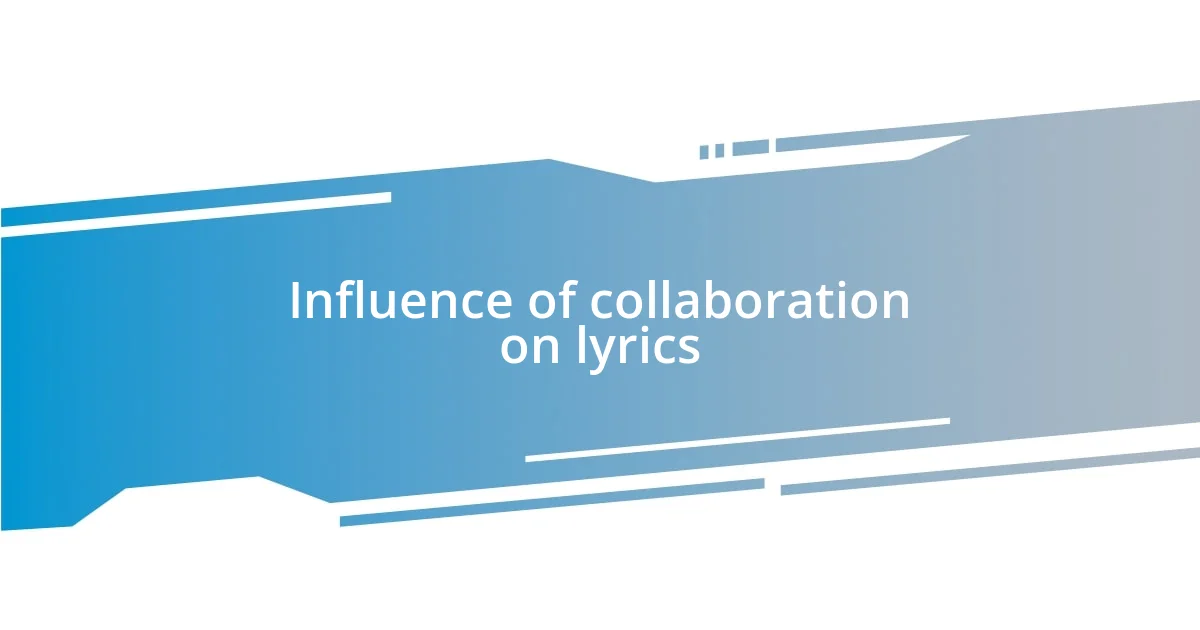
Influence of collaboration on lyrics
Collaborations have significantly enriched Taylor Swift’s lyricism, bringing diverse influences that enhance her storytelling. I remember the first time I heard her duet with Bon Iver on “Exile.” The emotional depth in their interplay took me to a different emotional plane, blending two unique styles seamlessly. Have you ever felt a song transform when another artist’s voice joins in, adding layers of meaning that resonate differently? That’s precisely what happens in these collaborations—they create a synergy that deepens the impact of the lyrics.
Working with varied artists also showcases her adaptability and willingness to embrace new sounds, which is impressive. When she teamed up with Jack Antonoff for much of “Lover,” the lyrics felt like a warm embrace, rich with optimism yet laced with vulnerability. It reminds me of how collaborating with others often pushes me to explore facets of my creativity I might not access on my own. Do you find that bouncing ideas off someone else can lead to unexpected breakthroughs? I know I do, and it’s that sense of exploration that keeps Taylor’s music feeling fresh and relatable.
Additionally, collaborations allow Taylor to reach deeper into different themes and perspectives. For instance, “Renegade,” her collaboration with Big Red Machine, explores the complexities of feeling like an outsider. I could relate to that sentiment, recalling times I’ve felt like I didn’t quite fit in, yet had to find a way to carve out my space. In those moments, the lyrics remind me that we all grapple with our identities. Isn’t it powerful how music can articulate those feelings we sometimes struggle to express ourselves? This blend of insights and emotions showcases how partnerships can create lyrics that spark profound reflection.
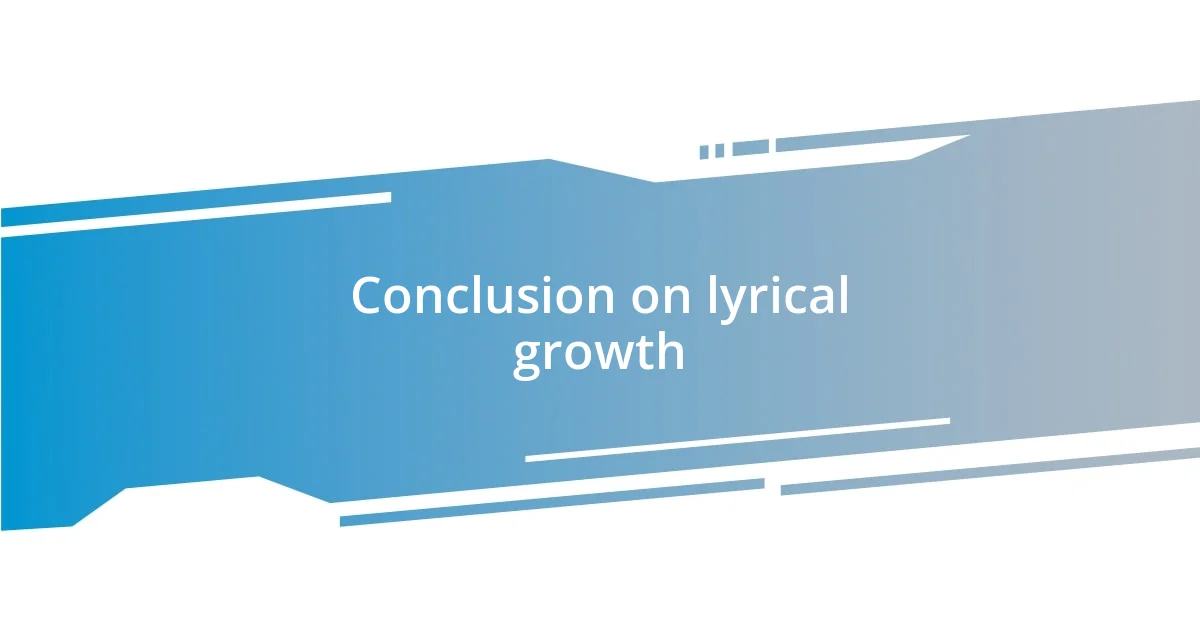
Conclusion on lyrical growth
As I reflect on Taylor’s lyrical growth, it’s clear that her evolution mirrors her personal journey. The progression from teenage heartbreak to nuanced adult themes is a testament to her deepening understanding of herself and the world. Isn’t it inspiring to witness someone transform their experiences into art that resonates with us all?
Her ability to tackle complex emotions strikes a chord with me, reminiscent of my own evolution as a writer. I remember the early days of penning my thoughts, where every line felt limited and raw. Taylor, too, has matured in her expression, deftly weaving intricate layers of meaning that invite listeners to explore alongside her. When did art become such a powerful vehicle for self-discovery in your life?
In the grand tapestry of her discography, each album serves as a chapter, revealing the lessons learned and the wisdom gained. Listening to her recent work, I feel as if I’m not just hearing a song, but also a story of resilience and hope. It’s that journey—the growth—woven into her lyrics that reminds me of the importance of vulnerability in nurturing connections. Have you felt the same pull, finding solace in shared struggles through music?












